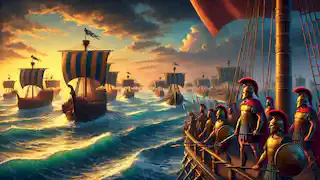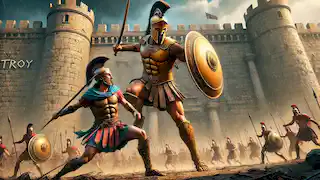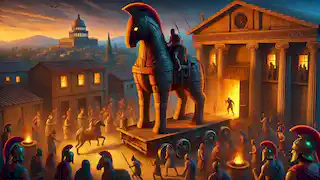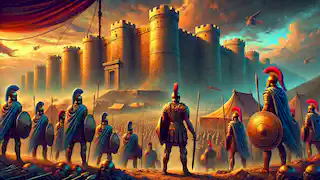The Trojan War is one of the most famous conflicts in Greek mythology, involving a multitude of heroes, gods, and tragic events that forever shaped ancient Greek lore. This epic war, fought between the Greeks (Achaeans) and the city of Troy, spanned over ten years and was sparked by a combination of divine intervention, mortal desires, and the whims of fate. While the war may have centered on one specific event—the abduction of Helen of Sparta—it became a stage where human bravery, cunning, and the caprices of the gods collided.
The war brought forth legendary warriors like Achilles, Hector, and Odysseus, whose names continue to echo through the ages. It ended with one of the most famous and cunning military strategies ever devised—the use of the Trojan Horse. But more than just a tale of battle, it was a story of love, betrayal, and loss that left lasting scars on both Troy and Greece. The roots of the Trojan War began long before the actual fighting commenced. The story is often traced to a dispute between three powerful goddesses—Hera, Athena, and Aphrodite—over a golden apple inscribed with the words "To the Fairest." This fateful apple was thrown into the wedding of Peleus and Thetis, where all the gods were gathered. Eris, the goddess of strife, had planted it in their midst, knowing that it would cause chaos. Zeus, not wanting to become involved in this divine squabble, appointed Paris, the prince of Troy, to choose which of the goddesses would receive the apple. Each goddess offered him a tempting bribe: Hera promised power, Athena offered wisdom and victory in war, and Aphrodite offered him the love of the most beautiful woman in the world—Helen of Sparta. Paris, bewitched by Aphrodite's offer, awarded her the apple. As a result, he gained Helen’s love, but in doing so, set into motion a series of events that would culminate in the fall of Troy. Helen was already married to Menelaus, the king of Sparta, and her abduction by Paris was the spark that ignited the conflict. Menelaus, along with his brother Agamemnon, gathered a vast Greek coalition to bring Helen back from Troy. Agamemnon, the king of Mycenae and the brother of Menelaus, quickly assumed the mantle of leadership for the Greek forces. The kings and heroes of Greece answered the call to arms, bringing with them their armies and ships. The most notable of these figures were Odysseus, the wily king of Ithaca; Ajax, the towering warrior with unmatched strength; Diomedes, the bold king of Argos; and Achilles, the nearly invincible hero whose rage would become one of the defining elements of the war. The Greek fleet, a massive armada of over a thousand ships, sailed across the Aegean Sea to lay siege to Troy. But before the Greeks could begin their campaign, they encountered their first obstacle: the winds had died, and their ships were becalmed. This was due to the wrath of Artemis, the goddess of the hunt, who demanded a sacrifice to appease her. Agamemnon, after much deliberation, agreed to sacrifice his own daughter, Iphigenia, to restore the winds. It was a grim and bitter start to the war. After the fleet reached the shores of Troy, the Greeks established their camp and laid siege to the city. For nine long years, the war raged on. The city of Troy was well-defended, its massive walls impenetrable, and its warriors—led by Hector, the valiant prince of Troy—proved to be more than a match for the Greek invaders. Hector became the foremost defender of the city, winning several key victories and gaining the respect of both his own people and his enemies. Achilles, on the other hand, was the greatest warrior on the Greek side. His fury and unmatched skill in battle were legendary. In the early years of the war, his exploits were numerous, and he was instrumental in defeating several Trojan allies. However, a deep personal conflict arose between Achilles and Agamemnon. When Agamemnon took Achilles' war prize, the maiden Briseis, from him, Achilles became enraged and withdrew from battle, refusing to fight any longer. This event would have far-reaching consequences, for without Achilles, the Greeks began to suffer severe losses. With Achilles out of the fight, Hector continued to dominate the battlefield. He led a successful assault on the Greek camp, pushing the Greeks back toward their ships. It was at this moment of desperation that Patroclus, Achilles’ closest friend, begged Achilles to let him don his armor and lead the Myrmidons into battle in his stead. Achilles reluctantly agreed, but with a stern warning to Patroclus not to go too far. Patroclus, however, emboldened by his early success, pursued the Trojans all the way to the gates of Troy. There, Hector confronted him and, mistaking him for Achilles, killed him in single combat. Patroclus’ death shattered Achilles. His grief quickly turned to rage, and he vowed to avenge his friend. He rejoined the battle with a terrifying fury. In a final confrontation between Hector and Achilles, the two greatest warriors of the war met outside the walls of Troy. Hector fought bravely, but he was no match for Achilles in his fury. After a fierce duel, Achilles killed Hector and, in an act of revenge, dragged his body around the walls of Troy. This brutal act of desecration horrified both the Trojans and the gods, and it marked a turning point in the war. Despite Hector’s death, Troy held firm for a time. The gods themselves were divided in their support, with some backing the Trojans and others aiding the Greeks. However, the end was inevitable. The Greeks, under the guidance of Odysseus, devised a brilliant and cunning plan to finally break the stalemate: the Trojan Horse. Odysseus ordered a giant wooden horse to be built, hollowed out to contain a select group of Greek soldiers. The Greeks then pretended to abandon their siege, leaving the horse behind as a supposed offering to the gods. The Trojans, believing they had won the war, brought the horse into the city as a trophy. That night, as the Trojans celebrated their apparent victory, the Greek soldiers emerged from the horse and opened the gates of Troy to the rest of the Greek army, which had secretly returned under the cover of darkness. The city was sacked, and the Trojans were slaughtered. King Priam was killed, and the women of Troy, including Queen Hecuba and Hector’s wife Andromache, were taken as slaves. The fall of Troy was not the end of the suffering for those involved in the war. For the Greeks, victory came at a great cost. The gods were angered by the Greeks' cruelty during the sack of Troy, and many Greek leaders would face divine retribution on their journeys home. Agamemnon himself met a tragic fate upon his return to Mycenae, where he was murdered by his wife, Clytemnestra, and her lover. Odysseus’ journey home became the subject of its own epic, "The Odyssey," as he faced countless trials and obstacles on his way back to Ithaca. Achilles, although victorious in battle, did not live to see the end of the war; he was killed by Paris, who shot him in the heel with an arrow, guided by the god Apollo. The heel was the only vulnerable part of Achilles’ body, giving rise to the term "Achilles' heel" in modern language. For the Trojans, the aftermath was even grimmer. Their once-great city lay in ruins, and the survivors were scattered or enslaved. The Trojan royal family was destroyed, and the legacy of Troy would become one of tragedy, a fallen kingdom that stood as a symbol of the destructive power of war. The Trojan War left an indelible mark on Greek mythology and culture. It became the subject of countless poems, plays, and stories that celebrated both the heroism and the futility of war. The "Iliad," attributed to the poet Homer, is the most famous account of the war, focusing primarily on the rage of Achilles and the tragic death of Hector. The "Aeneid," written by the Roman poet Virgil, tells of the Trojan hero Aeneas, who escapes the fall of Troy and goes on to found the city that would one day become Rome. The Trojan War, though rooted in mythology, may also have some basis in historical events. Archaeological evidence suggests that a city resembling Troy existed and was destroyed around the time traditionally associated with the war. Whether the war itself was real or a blend of myth and history remains a topic of debate among scholars, but its impact on Western literature and culture is undeniable. The story of the Trojan War is one of the greatest tales ever told—a complex weave of heroism, divine intervention, and human emotion. Its characters, from the wrathful Achilles to the noble Hector, continue to resonate with readers and audiences, representing the eternal themes of honor, loyalty, love, and the consequences of human pride. In the end, the war serves as a reminder of the tragic cost of conflict and the fragile nature of human greatness.The Seeds of Conflict

The Gathering of the Achaean Forces
The Siege Begins

Hector and Achilles
The Fall of Troy

The Aftermath

Legacy and Myth
Conclusion


















